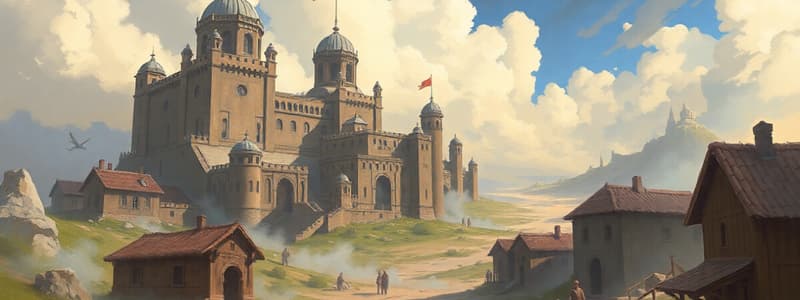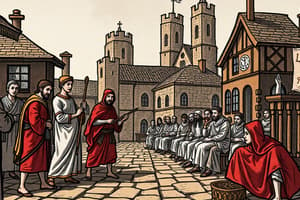Podcast
Questions and Answers
What does the term 'nomadic people' refer to?
What does the term 'nomadic people' refer to?
- People who live in urban areas permanently
- People who stay in one place to cultivate land
- People who primarily rely on trade for survival
- People who travel to find food or resources (correct)
What is an example of a 'static settlement'?
What is an example of a 'static settlement'?
- A nomadic tribe
- A traveling community
- A village or city (correct)
- A temporary campsite
Which term describes the belief in many gods?
Which term describes the belief in many gods?
- Atheism
- Theism
- Monotheism
- Polytheism (correct)
What does 'legacy' refer to?
What does 'legacy' refer to?
What is the definition of 'empire'?
What is the definition of 'empire'?
Which of the following best describes 'continuity'?
Which of the following best describes 'continuity'?
Which term is used for the belief in only one god?
Which term is used for the belief in only one god?
What does AD stand for in historical dating?
What does AD stand for in historical dating?
During which period did people start to live in static settlements?
During which period did people start to live in static settlements?
What was a common characteristic of the Age of Bands?
What was a common characteristic of the Age of Bands?
What significant development occurred during the Age of Kingdoms?
What significant development occurred during the Age of Kingdoms?
What was a feature of the Age of Empires?
What was a feature of the Age of Empires?
Around what time did kingdoms start to appear?
Around what time did kingdoms start to appear?
What does the term 'interpretations' refer to in historical studies?
What does the term 'interpretations' refer to in historical studies?
What indicates the shift in power dynamics during the 20th century?
What indicates the shift in power dynamics during the 20th century?
Flashcards are hidden until you start studying
Study Notes
Dates In History
- AD is used for years after the believed birth of Jesus Christ.
- BC is used for years before the believed birth of Jesus Christ.
- AD dates count up from the year 1.
- BC dates count down from the year 1.
Time Periods
- Decade: 10 years
- Century: 100 years
- Millennium: 1000 years
Historians
- Historians use:
- Enquiries: Questions to explore the past
- Sources: Materials from the past to provide evidence
- Interpretations: Explanations based on research
- Representations: Ways to communicate their findings
The Age of Bands (100,000 BC - 10,000 BC)
- People lived in small, nomadic groups of 30-50.
- They used basic tools and relied on animals for survival.
The Age of Tribes (10,000 BC - 3000 BC)
- People started to live in static settlements.
- Began trading with each other.
- Food production through agriculture started.
The Age of Kingdoms (3000 BC - 1500 AD)
- Kingdoms emerged around 3000 BC.
- People continued to farm and make things at home.
- Polytheism emerged: Belief in multiple gods.
- Kingdoms could contain millions of people.
The Age of Empires (1500 - 1945)
- The rise of large empires that controlled multiple territories.
- Factory production began.
- Some parts of the world abandoned polytheism and adopted monotheistic beliefs.
- Empires could contain millions of people.
The 20th Century
- Countries began demanding self-rule (independence).
- Most countries became fully independent by the end of the century.
Studying That Suits You
Use AI to generate personalized quizzes and flashcards to suit your learning preferences.




